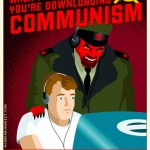Some weeks you couldn’t buy a news story, this week, there’s enough for two weeks. Don’t really know why, perhaps the MPAA is upping their lobbying efforts, or the courts have resumed their cases, and parliaments are reconvened to pass new legislations. Who knows. On my end, I finished the review for WinDVD 2010 as promised. A summary? Well, I’d rather you read the full review, but suffice to say there are things that I like about WinDVD, and there are some things that its competitors have done that it has not. Is it a great Blu-ray player? Yes it is. Can it be better, that’s a yes too.

Copyright news first, and there are quite a few to go through. Right after my last WNR, news came that torrent tracker UK-T was shut down, and some kind of police action was involved, but as no anti-piracy agency had claimed responsibility at that time, nobody was really sure what went down. Still not really sure what happened, but from leaked reports, it suggest that the police had raided the homes of several of the site’s admins. The database was wiped before the police could get their hands on it, and so the subscribers are safe. One tracker down, only 362,621 to go.
But while one torrent tracker was down, another came back up. Demonoid has been down for ages now, supposedly due to a database problem, but the tracker is at least up again, if not the main website. I’ve noticed that several torrent sites have experienced similar database problems recently, so it could be just a coincidence, or perhaps something more sinister? If it was just an accident, then these accidents have actually done more to stop torrent sites than all the legal actions. Take The Pirate Bay for example. The latest attempt to shut the site down, or at least prevent access to it in Norway, has failed. The entertainment lobby had asked the Norwegian court to get Norway’s largest ISP Telenor to shut down access to the torrent site, but the court said “Nei” as they didn’t think an ISP should be the one deciding which websites its customers get access to, and which it should block. And the implication of this ruling is that ISPs are not really responsible for what their customers get up to, since if they were, then the court would have told them to shut off access. To me, this is common sense, and Telenor’s spokesman’s analogy of not being able to sue a ladder manufacturer because someone used the ladder to commit a burglary again seems to make sense to me. But common sense is in short supply these days when it comes to the copyright debate.
The failed attempt to shut down The Pirate Bay again deals another blow to the MPAA and their friends, but do they really want the torrent site to be shut down? According to a new study, they should be careful of what they wish for, because during the few days that The Pirate Bay was down, the number of torrent trackers and websites dramatically increased, and downloading continued. The way modern torrent clients work, even without a working tracker, downloads can continued thanks to a technology called DHT (Distributed Hashed Table), or so called trackerless downloads. The download speed is sometimes affected, but not always. And with TPB down, many sees it as an opportunity to become the new TPB, and so naturally, the number of torrent and trackers will surge during this period. It just shows how hard it is to actually try and stop file sharing, and I think it may actually be impossible. All the resources that have been spent on trying to stop file sharing seems like a big waste to me. And even more so when you consider the stats that show that people who download illegal songs actually spend more on music than those who don’t. This again seems like common sense to me, because people who download music (legally, or illegally) are the ones that love music, and many are using free downloads as a way to search for new songs and artists. This “buy before you try” argument has been made for other content as well, like games, although the percentage that converts from try to buy is rather low, nevertheless, there is a percentage. Music especially I think is something that you do need to try before you buy, that’s why we have radio stations that broadcast songs, for free. The music industry, and others, should be exploiting this phenomenon to their advantage instead of trying to shut it down. Spotify, the free online music service, seems to signal a possible future direction, basically taking the radio model online.
There’s still more copyright news, we’re barely half way through. The MPAA has been busy lobbying the FCC for various things. And as a concerted campaign, they had the US 60 Minutes broadcast a copyright propaganda film that tried to link file sharing with organized crime. There are links between counterfeit goods and physical media piracy with organized crime, but online file sharing that’s mostly free? The downloading communism poster immediately springs to mind (see right). More propaganda as the MPAA says the Internet will die if piracy is not stopped. This is the same MPAA that has been trying to kill the Internet for ages now, that its members and supporters have publicly stated their wish that the Internet had never existed, so why are they so worried about its health now? And the MPAA is not just happy pushing their agenda on the US, they’re going global as well. You can just see their dirty fingerprints over the proposed copyright treaty that will be discussed in South Korea this month. The worst part is that the treaty is being kept super top secret, even though it affects everyone. Of course, the Internet being the Internet, part of the discussions were leaked and it was indeed what we fear most. Three-strikes, global DMCA, ISP policing … are just some of the MPAA’s favourite things, and all will be tabled at the secret discussions later this month. Sigh.
Three-strikes and ISP policing, very popular at the moment, but the EU has decided that something needs to be done to protect consumer rights, even if what they did was not nearly enough. But it’s a start. The EU has decided that Internet access is a basic right, and as such, cutting people’s connections off will require more than just an email from the MPAA. The EU has ruled that a fair process must be in place before bannings can occur, which is less than the full criminal trial that consumer and Internet advocates had first wanted. This all came after France wanted to introduce something that legalized their three-strikes plan (the original one that didn’t require the judicial system, which their own constitutional council found to be, well, unconstitutional), and that angered pretty much everyone at the EU, and the battle has been fought ever since, leading to this latest compromise. Just what has happened to France, a country that I’ve always considered to be quite liberal and would usually be at the front lines fighting *against* the three-strikes nonsense, and not on the side of mega US corporations. Freedom and liberty is also another thing I associate with France, but they just seem to be one the wrong side of that as well because time and time again, it has been shown that copyright laws have been abused to stifle free speech and the critics of corporations. The Electronic Frontier Foundation even has a Hall of Shame for the companies and organizations that have abused copyright laws for their own (non copyright related) benefits. It just shows that when laws are so biased towards one side, they are prime candidates for abuse. And for me it’s hard to digest the fact that a country like France is in there arguing to make these laws even more one sided, and even more open to abuse. But with a guy like Sarkozy at the helm, now using the nations divisions for his political gain, no one expect anything less really. Hall of shame indeed.
The global DMCA thing is particularly annoying, although not that much of an impact since most countries have adopted some draconian form of it. One country is Denmark, and one citizen is doing his unique way of protesting the illogical nature of the laws. Under the DMCA, or the Danish equivalent, any attempt (even unsuccessful) at breaking DRM is considered illegal. However, Danish law allows for DVDs to be ripped for legal home use, and so the two Danish laws actually conflict each other. This is why Henrik Andersen confessed his “crimes” of ripping hundreds of his legally purchased DVDs for use in his home theater setup, to a Danish anti-piracy agency. Under the DMCA, Mr Andersen is guilty and should be fined, if not jailed. But just whose interests has he actually hurt? Certainly not the movie studios that he purchased his DVDs from.
Still more copyright stuff, bear with me. The third week of the Australian AFACT vs iiNet trial continues, and please refer to my summary forum post to keep yourself updated on this rather important trial, possibly the most important in the world right now concerning the copyright issue, as it seeks to decide if ISPs should be turned into copyright cops.
And in all this bad news, there’s a glimmer of hope for a fair solution that everyone can live with. Google/YouTube is finding that their compromise solution to the copyright issue, of sharing revenue with content owners if they choose not to remove stuff from YouTube, might be working. And working well, as a third of all their YouTube revenue is coming from this trial program. And it’s not just the extra revenue, the exposure on YouTube leads to more business opportunities for content owners, like the case of Mr Bean, the popular UK comedy series, in which the content owners decided to keep the user uploaded clips online, as opposed to removing it, and then found that it actually led to deals with TV stations countries that have never heard of Mr Bean before. So a bit of technical piracy actually led to a successful TV deal, and all while still making money from YouTube profit sharing. And yet others, like Viacom, are still hell bent on suing YouTube into oblivion. Shorted sighted or what?

Well that was a big section wasn’t it. On to HD news now, although it’s still copyright related, I’m afraid. Managed Copy, the so called legal solution to movie ripping, will soon be upon us. December 4th marks the date that MC becomes a reality on Blu-ray.
I’m excited about MC, because it signals the first step that the movie industry has taken to legitimize the need for people to be able to separate the movie from the disc that it came on. With today’s increasingly digital world and sophisticated home theater solutions, being able to have everything as pure digital data is increasingly useful. Imagine having all your DVD and Blu-ray movies stored digitally and accessible with a few clicks of your remote. It makes categorizing easier, searching even more so, and it will be faster as well, and quieter due to the lack of a spinning optical drive. But to make this reality requires you to break several laws at the moment, but MC might be just what is needed to solve this problem.
But while I’m excited, the movie studios are less so apparently, as there’s just no support for MC despite the December 4th deadline. I suppose this is something whose success and popularity will only be apparent after it has been introduced, and just like the “Digital Copy” feature that the movie studios have only now grown to love, it’s going to take a time before they overcome their fears. And this could be the feature to keep Blu-ray in the game when it eventually goes head to head with digital distribution (with Best Buy the latest to get into the digital download market). Whether you get it from the Internet, or from a USB stick, or on a Blu-ray disc, in the end, it’s the digital movie that’s important, not the way it arrives to your home. And for HD content, Blu-ray disc (sent via the postal system) may still be the best solution, from a cost and even speed perspective (see pigeon test).
![]()
And lastly in gaming, Sony’s losses from the PS3 have now topped $4.6 billion. But Sony is hoping to add perhaps a couple of more billions to this figure, as the more they lose, it means the more PS3 consoles they are selling, and that’s a good thing for them in the long term, if extremely hurtful in the short. In the post I made there are also links to the losses being made by Nintendo and Microsoft. The amazing figures for Nintendo, in which they’ve been in profit every year since the stats were first available, shows that even though they’ve had a few failed consoles in between, their strategy of concentrating on fun first, and technology second, is still paying off.
And that’s the news for this week. I’m willing to bet that next week will be super quiet as news sources regurgitate this week’s news items in various flavours. Oh, I got my graphics card back from warranty (the first one, with the broken fan). It’s now working great and the average temperature was about 10 degrees (Celsius) lower than when I first got the card, meaning that even when the fan was spinning, it was still overheating.





